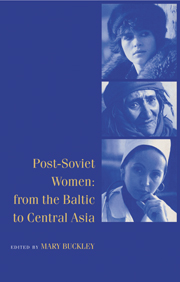Book contents
- Frontmatter
- Contents
- List of figures
- List of tables
- Notes on contributors
- Note on transliteration
- Map
- INTRODUCTION
- PART I WOMEN IN THE RUSSIAN FEDERATION
- 2 Do Russian women want to work?
- 3 Rural women and the impact of economic change
- 4 Women and the culture of entrepreneurship
- 5 Images of an ideal woman: perceptions of Russian womanhood through the media, education and women's own eyes
- 6 ‘She was asking for it’: rape and domestic violence against women
- 7 ‘For the sake of the children’: gender and migration in the former Soviet Union
- 8 When the fighting is over: the soldiers' mothers and the Afghan madonnas
- 9 Adaptation of the Soviet Women's Committee: deputies' voices from ‘Women of Russia’
- 10 Women's groups in Russia
- PART II WOMEN OUTSIDE RUSSIA IN NEWLY INDEPENDENT STATES
- Index
4 - Women and the culture of entrepreneurship
Published online by Cambridge University Press: 18 December 2009
- Frontmatter
- Contents
- List of figures
- List of tables
- Notes on contributors
- Note on transliteration
- Map
- INTRODUCTION
- PART I WOMEN IN THE RUSSIAN FEDERATION
- 2 Do Russian women want to work?
- 3 Rural women and the impact of economic change
- 4 Women and the culture of entrepreneurship
- 5 Images of an ideal woman: perceptions of Russian womanhood through the media, education and women's own eyes
- 6 ‘She was asking for it’: rape and domestic violence against women
- 7 ‘For the sake of the children’: gender and migration in the former Soviet Union
- 8 When the fighting is over: the soldiers' mothers and the Afghan madonnas
- 9 Adaptation of the Soviet Women's Committee: deputies' voices from ‘Women of Russia’
- 10 Women's groups in Russia
- PART II WOMEN OUTSIDE RUSSIA IN NEWLY INDEPENDENT STATES
- Index
Summary
I can assure you of one thing with certainty – it is negative: my presentation will be devoid of all theory. In this fashion I hope to succeed in allowing the ‘creatural’ to speak for itself: inasmuch as I have succeeded in seizing and rendering this very new and disorienting language that echoes loudly through the resounding mask of an environment that has been totally transformed. I want to write a description of Moscow at the present moment in which ‘all factuality is already theory’ and which would thereby refrain from any deductive abstraction, from any prognostication, and even within certain limits, from my judgement – all of which, I am absolutely convinced, cannot be formulated in this case on the basis of spiritual ‘data’, but only on the basis of economic facts over which few people, even in Russia, have a sufficiently broad grasp.
Walter Benjamin, letter to Martin Buber, 23 February 1927Introduction
As new economic institutions and business culture and practices develop in Russia, entrepreneurship and small and medium enterprise formation have become key words and all-favourite policy recommendations in the transition process to the market. While the contradictions between the formal and informal levels of economic development are fairly widely recognised both by business actors and analysts (Russian and foreign), little attention has been given to some of the implications that these double standards are having on women's ability to access the business environment as earning producers.
- Type
- Chapter
- Information
- Post-Soviet WomenFrom the Baltic to Central Asia, pp. 56 - 74Publisher: Cambridge University PressPrint publication year: 1997
- 11
- Cited by



